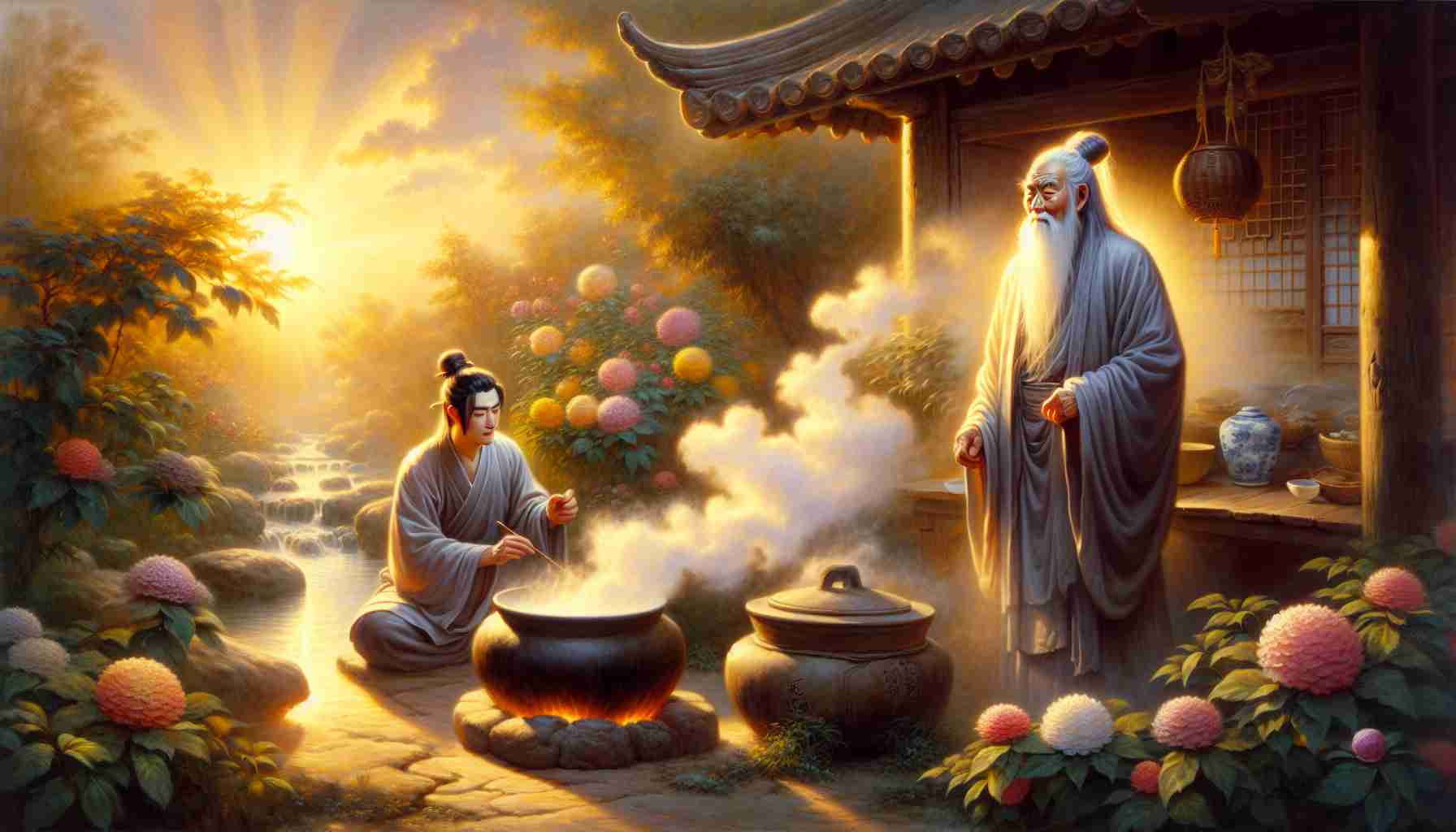

Steam rose above the clay stove, curling gently through the open-air kitchen. I wiped my brow and gave the pot another stir. My name is Lin, and I was the palace cook for the Lord of Han Valley. I was known for using rare spices, perfect cuts, and all the newest techniques. People nodded when they walked past me, whispering, “That’s Master Lin, the great cook!”
But I didn’t feel great. Every day, I ran around—chopping, boiling, dashing from fire to fire. I barely slept. The more I tried to make things perfect, the more stressed I became. I believed success meant always doing more. Until one very strange day...
The Lord announced, “Tomorrow, Laozi will visit the palace.” My heart skipped. Laozi! The wise man who spoke of the Tao—the Way of nature, of flow, of simplicity. He was very old now, with a long white beard and bright, quiet eyes. People said he could understand the world by watching a leaf float down a stream.
The next day, I decided to make the most perfect meal of my life. I cooked all day—five dishes, seven sauces, steamed buns shaped like flowers. The kitchen filled with smells of garlic, ginger, and roasted duck.
When Laozi sat down to eat, I peeked out. He ate slowly, smiling kindly. Afterward, he bowed and said, “The meal was filled with flavor, but a little heavy on effort.”
“Too much effort?” I blinked. I had given everything I had.
He invited me to walk with him. In the garden, I watched as he bent to smell a tiny white flower. The wind moved the petals, soft and quiet.
“Lin,” he said, “do you see how the flower blooms without trying? It doesn’t chase the sun. It just opens when it’s time.”
I didn’t know what to say. Cooking always felt like chasing—timers, knives, heat, speed.
He pointed to the stream nearby. “When water flows, it doesn’t force its way. It goes around rocks. It takes the easiest path, yet it feeds everything.”
I frowned. “But... I thought great cooking needed great effort.”
“True cooking,” he said, “is like life. When your hands follow the Tao—calm, balanced, simple—your food will nourish not just the belly, but the heart.”
That night, I didn’t plan. I didn’t measure. I let the ingredients lead me. I stirred when it felt right, salted when it smelled ready. When I served the next dish to Laozi, he smiled and said just one word: “Harmony.”
I didn’t change overnight. But from then on, I worked differently. I stopped rushing. I chopped slower, breathed more. The kitchen grew quiet. My cooking became simpler, but people said it warmed them from the inside.
I still remember Laozi’s words: “A great meal isn’t forced—it flows.” And now, each time I cook, I listen—not just to the food, but to the space between the sounds. Somewhere in that stillness, the Tao stirs the spoon.
And that is the secret recipe.
Steam rose above the clay stove, curling gently through the open-air kitchen. I wiped my brow and gave the pot another stir. My name is Lin, and I was the palace cook for the Lord of Han Valley. I was known for using rare spices, perfect cuts, and all the newest techniques. People nodded when they walked past me, whispering, “That’s Master Lin, the great cook!”
But I didn’t feel great. Every day, I ran around—chopping, boiling, dashing from fire to fire. I barely slept. The more I tried to make things perfect, the more stressed I became. I believed success meant always doing more. Until one very strange day...
The Lord announced, “Tomorrow, Laozi will visit the palace.” My heart skipped. Laozi! The wise man who spoke of the Tao—the Way of nature, of flow, of simplicity. He was very old now, with a long white beard and bright, quiet eyes. People said he could understand the world by watching a leaf float down a stream.
The next day, I decided to make the most perfect meal of my life. I cooked all day—five dishes, seven sauces, steamed buns shaped like flowers. The kitchen filled with smells of garlic, ginger, and roasted duck.
When Laozi sat down to eat, I peeked out. He ate slowly, smiling kindly. Afterward, he bowed and said, “The meal was filled with flavor, but a little heavy on effort.”
“Too much effort?” I blinked. I had given everything I had.
He invited me to walk with him. In the garden, I watched as he bent to smell a tiny white flower. The wind moved the petals, soft and quiet.
“Lin,” he said, “do you see how the flower blooms without trying? It doesn’t chase the sun. It just opens when it’s time.”
I didn’t know what to say. Cooking always felt like chasing—timers, knives, heat, speed.
He pointed to the stream nearby. “When water flows, it doesn’t force its way. It goes around rocks. It takes the easiest path, yet it feeds everything.”
I frowned. “But... I thought great cooking needed great effort.”
“True cooking,” he said, “is like life. When your hands follow the Tao—calm, balanced, simple—your food will nourish not just the belly, but the heart.”
That night, I didn’t plan. I didn’t measure. I let the ingredients lead me. I stirred when it felt right, salted when it smelled ready. When I served the next dish to Laozi, he smiled and said just one word: “Harmony.”
I didn’t change overnight. But from then on, I worked differently. I stopped rushing. I chopped slower, breathed more. The kitchen grew quiet. My cooking became simpler, but people said it warmed them from the inside.
I still remember Laozi’s words: “A great meal isn’t forced—it flows.” And now, each time I cook, I listen—not just to the food, but to the space between the sounds. Somewhere in that stillness, the Tao stirs the spoon.
And that is the secret recipe.